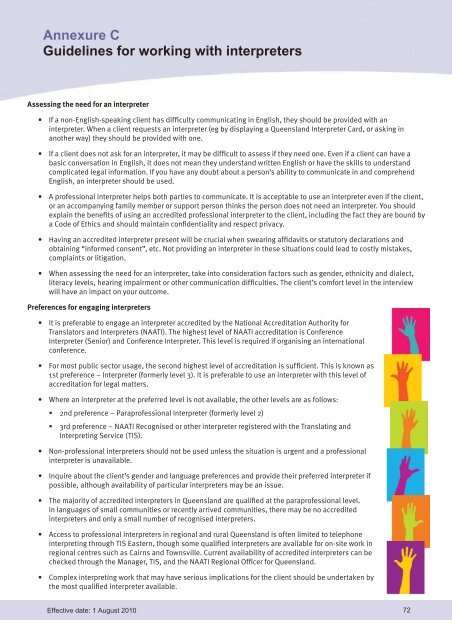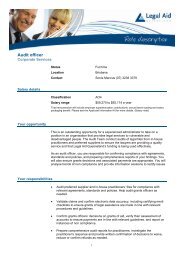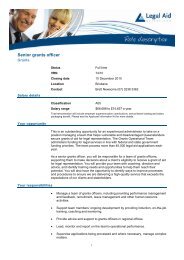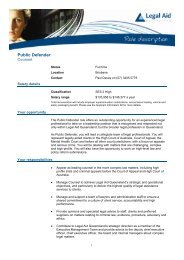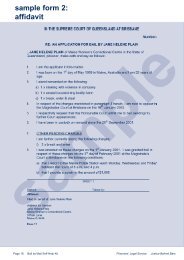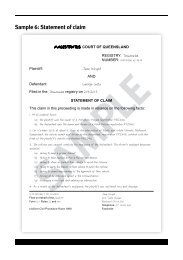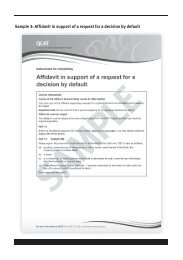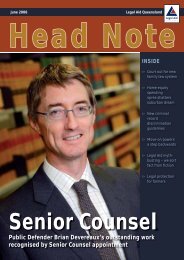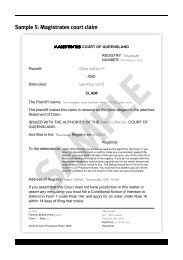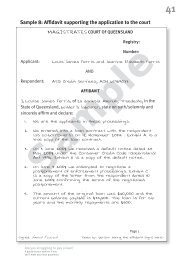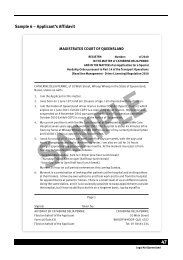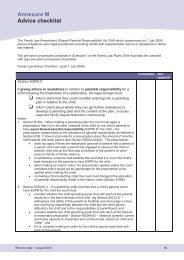Guidelines for working with interpreters - Legal Aid Queensland
Guidelines for working with interpreters - Legal Aid Queensland
Guidelines for working with interpreters - Legal Aid Queensland
Create successful ePaper yourself
Turn your PDF publications into a flip-book with our unique Google optimized e-Paper software.
Annexure C<strong>Guidelines</strong> <strong>for</strong> <strong>working</strong> <strong>with</strong> <strong>interpreters</strong>Assessing the need <strong>for</strong> an interpreter• If a non-English-speaking client has difficulty communicating in English, they should be provided <strong>with</strong> aninterpreter. When a client requests an interpreter (eg by displaying a <strong>Queensland</strong> Interpreter Card, or asking inanother way) they should be provided <strong>with</strong> one.• If a client does not ask <strong>for</strong> an interpreter, it may be difficult to assess if they need one. Even if a client can have abasic conversation in English, it does not mean they understand written English or have the skills to understandcomplicated legal in<strong>for</strong>mation. If you have any doubt about a person’s ability to communicate in and comprehendEnglish, an interpreter should be used.• A professional interpreter helps both parties to communicate. It is acceptable to use an interpreter even if the client,or an accompanying family member or support person thinks the person does not need an interpreter. You shouldexplain the benefits of using an accredited professional interpreter to the client, including the fact they are bound bya Code of Ethics and should maintain confidentiality and respect privacy.• Having an accredited interpreter present will be crucial when swearing affidavits or statutory declarations andobtaining “in<strong>for</strong>med consent”, etc. Not providing an interpreter in these situations could lead to costly mistakes,complaints or litigation.• When assessing the need <strong>for</strong> an interpreter, take into consideration factors such as gender, ethnicity and dialect,literacy levels, hearing impairment or other communication difficulties. The client’s com<strong>for</strong>t level in the interviewwill have an impact on your outcome.Preferences <strong>for</strong> engaging <strong>interpreters</strong>• It is preferable to engage an interpreter accredited by the National Accreditation Authority <strong>for</strong>Translators and Interpreters (NAATI). The highest level of NAATI accreditation is ConferenceInterpreter (Senior) and Conference Interpreter. This level is required if organising an internationalconference.• For most public sector usage, the second highest level of accreditation is sufficient. This is known as1st preference – Interpreter (<strong>for</strong>merly level 3). It is preferable to use an interpreter <strong>with</strong> this level ofaccreditation <strong>for</strong> legal matters.• Where an interpreter at the preferred level is not available, the other levels are as follows:• 2nd preference – Paraprofessional Interpreter (<strong>for</strong>merly level 2)• 3rd preference – NAATI Recognised or other interpreter registered <strong>with</strong> the Translating andInterpreting Service (TIS).• Non-professional <strong>interpreters</strong> should not be used unless the situation is urgent and a professionalinterpreter is unavailable.• Inquire about the client’s gender and language preferences and provide their preferred interpreter ifpossible, although availability of particular <strong>interpreters</strong> may be an issue.• The majority of accredited <strong>interpreters</strong> in <strong>Queensland</strong> are qualified at the paraprofessional level.In languages of small communities or recently arrived communities, there may be no accredited<strong>interpreters</strong> and only a small number of recognised <strong>interpreters</strong>.• Access to professional <strong>interpreters</strong> in regional and rural <strong>Queensland</strong> is often limited to telephoneinterpreting through TIS Eastern, though some qualified <strong>interpreters</strong> are available <strong>for</strong> on-site work inregional centres such as Cairns and Townsville. Current availability of accredited <strong>interpreters</strong> can bechecked through the Manager, TIS, and the NAATI Regional Officer <strong>for</strong> <strong>Queensland</strong>.• Complex interpreting work that may have serious implications <strong>for</strong> the client should be undertaken bythe most qualified interpreter available.Effective date: 1 August 201072
<strong>Guidelines</strong> <strong>for</strong> <strong>working</strong> <strong>with</strong> <strong>interpreters</strong>Professional <strong>interpreters</strong> vs family and friends; bilingual staff as <strong>interpreters</strong>• Friends and family members should not be used in the same role as professional <strong>interpreters</strong>, unless there is noother practical option. Obtaining a qualified interpreter over the telephone will generally always be a practicaloption. Children and young relatives are not appropriate <strong>interpreters</strong> in any context.• Both clients and family members may be embarrassed when family members act as <strong>interpreters</strong>.• Communication may be distorted or changed because of:• lack of competence in English, particularly English used in a legal context• lack of competence in the client’s first language• lack of interpreting skills• bias and lack of impartiality by the family member/friend. In many circumstances however the client may feelmore com<strong>for</strong>table <strong>with</strong> a family member or friend present, in addition to the professional interpreter.• Professional <strong>interpreters</strong> are trained to maintain confidentiality, impartiality and accuracy as part of their code ofethics. This code is not binding on relatives or friends, or bilingual staff.• Bilingual staff who are not accredited <strong>interpreters</strong> may assist <strong>with</strong> communication <strong>with</strong> clients in certaincircumstances. But as the general rule, professional <strong>interpreters</strong> should be used <strong>for</strong> the reasons outlined above andto establish the independence of the process.• If a client refuses professional interpreter services, preferring to use an accompanying child, relative or friend,staff should be trained to provide an appropriate response eg “non-professional <strong>interpreters</strong> may compromiseor misinterpret important communication”. Staff should advise clients that our policy is to use professional<strong>interpreters</strong> and emphasise this policy helps everyone involved in the communication process.Arranging an interpreter• Professional interpreting services can be accessed either over the phone (solely through TIS) oron-site, where the interpreter is physically present. Audio-visual access through videoconferencingnetworks is also possible.• TIS is our translating and interpreting services preferred supplier. To arrange an interpreting servicecontact:• TIS on-site (face-to-face) interpreting. Pre-book by fax on 1300 654 151 <strong>with</strong> reasonable notice(generally 24 hours notice). Request <strong>for</strong>ms <strong>for</strong> fax purposes are available from TIS. Follow thelinks from the multicultural resources page on the LAQ intranet.• Or book by phoning TIS on 1300 655 081. After hours access to TIS is through TIS Melbourne.• TIS – telephone interpreting. Pre-book by fax on 1300 654 151 or by phoning 131 450 immediately. Prebookedtelephone interpreting jobs will incur a charge over and above the basic rate.• Other sources of translators and <strong>interpreters</strong> are:• Deaf Services <strong>Queensland</strong> (<strong>for</strong> AUSLAN and other Deaf community <strong>interpreters</strong>). Pre-book byfax on an Interpreter Request Form on 07 3556 1331 or phone 07 3356 8255 (office hours) or1800 630 745 (after hours).• A list of NAATI accredited <strong>interpreters</strong> is available through the current NAATI Directory or from theNAATI Regional Officer, Brisbane on 07 3393 1358. The NAATI website address is: www.naati.com.au• The International Association of Conference Interpreters (AIIC) Australian members is available on02 6633 7122.• Private interpreting and translating agencies are available through the Yellow Pages under“<strong>interpreters</strong>”.Effective date: 1 August 201073
<strong>Guidelines</strong> <strong>for</strong> <strong>working</strong> <strong>with</strong> <strong>interpreters</strong>• Check the NAATI accreditation and qualifications of translators obtained through any source.• Make your booking by giving as much notice as possible.• Establish gender and language/dialect preferences from the client and request these from the provider.• Request the same interpreter where continuity and client confidence are important factors.Paying <strong>for</strong> interpreting services• <strong>Legal</strong> <strong>Aid</strong> <strong>Queensland</strong> is responsible <strong>for</strong> budgeting <strong>for</strong> and paying <strong>for</strong> <strong>interpreters</strong>. Clients do not have to pay <strong>for</strong><strong>interpreters</strong>.• A grant of aid <strong>for</strong> interpreting services can be requested from <strong>Legal</strong> <strong>Aid</strong> by either the applicant or the solicitor.• The use of an interpreter is one factor that may be taken into consideration when determining if a matter is a‘complex matter’ <strong>for</strong> the purpose of grants of aid.• The TIS charging policy and rates are available from the Manager, TIS Eastern on 02 9258 4640.• Rate details recommended by AUSIT, the professional association of interpreting/translating practitioners areavailable by calling AUSIT <strong>Queensland</strong> on 07 3356 8255.Most effective interpreting mode• Telephone interpreting is cost-effective, readily available regionally, and can be used <strong>for</strong> most languages throughthe TIS national network. It is more immediate, anonymous and preserves confidentiality and privacy. Thedisadvantage is the difficulty <strong>for</strong> all parties when visual cues are absent.• On-site interpreting is more appropriate in legal and counselling contexts. It offers a more completeand detailed communication option <strong>with</strong> the possibility of continuity <strong>with</strong> the same interpreter.Continuity can be a vital factor in confidential and sensitive matters, such as those relating toviolence against women.• Videoconferencing networks can be used in legal and other contexts to include an accreditedinterpreter at a distant site.• Conference environments, where simultaneous interpreting is required in a number of languages, canbe arranged using existing <strong>Queensland</strong> facilities.Accountability• Professionally accredited <strong>interpreters</strong> are required to observe their own professional obligations andcomply <strong>with</strong> relevant codes of ethics and professional conduct to maintain confidentiality, accuracyand impartiality. The AUSIT Code of Ethics <strong>for</strong> Interpreters and Translators is endorsed by NAATI andcan be obtained from local AUSIT representatives.• Staff should verify the identification details of TIS and other <strong>interpreters</strong> by checking their identitycard and accreditation details. Unsatisfactory per<strong>for</strong>mance by TIS <strong>interpreters</strong> should be brought tothe attention of the Manager, TIS Eastern on 02 9258 4640.Skilling staff in <strong>working</strong> <strong>with</strong> <strong>interpreters</strong>• The <strong>Queensland</strong> Interpreter Card Kit contains simple procedural checklists <strong>for</strong> <strong>working</strong> <strong>with</strong><strong>interpreters</strong> and responding to the <strong>Queensland</strong> Interpreter Card. The kits are available from <strong>Legal</strong> <strong>Aid</strong><strong>Queensland</strong>’s Media and Public Affairs Unit.Effective date: 1 August 201074


